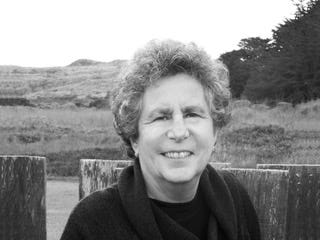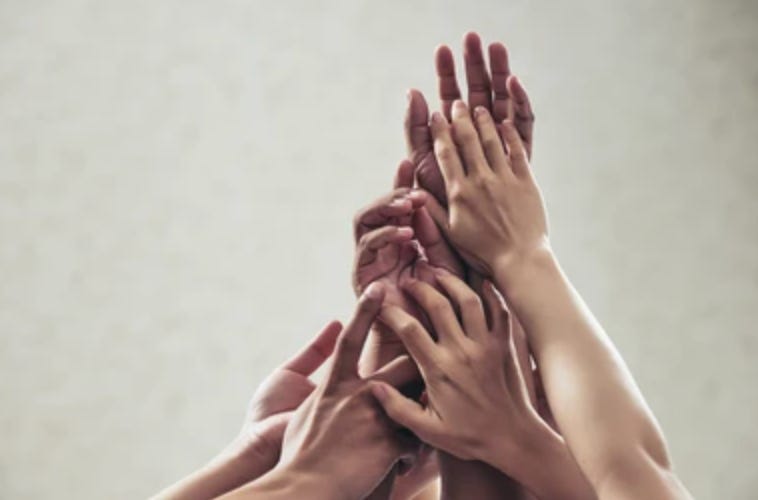Simchat Torah has always been a difficult day for me, as are most of the chagim of great joy. The ebullience overwhelming. The time when every man and even the children got an alyiah l’Torah and blessings as I sat in the women’s section, occasionally standing to see my husband dancing with one of the kids on his shoulders or greeting an excited child who needed a snack or the bathroom. There was always one shul where the the women also danced with the Torah, but I was married to someone who thought that too much of “feminist statement,” admonishing me that I wouldn’t be able to “handle the heaviness of a Torah scroll” and, if I dropped it I would bring destruction on the whole community.
Simchat Torah was the day we ended-finishing the reading of the entire Five Books of Moses, a portion each week, and the day we began—reading the first lines of Genesis before we prayed for rain. How strange that it was on this day of complicated happinesses that we suffered the worst pogram since the Holocaust? And not in Germany, not in New York or South Africa, but here in Israel, the state built as a safe haven for the Jewish People. On that morning last year I listened to the radio as people in the kibbutzes near Gaza called in from their safe rooms to beg for help as the homes they were in burned around them and no one came. I watched on television the image of a white truck filled with terrorists in the streets of Sderot, the image of Naama Levy unpacked like a suitcase from the trunk of a jeep, her pants covered in blood, the image of Shani Louk’s (z”l) broken body paraded through the streets of Gaza City. And on that morning I laid all the blame I had in my heart right on the feet of the Israeli government and Bibi Netanyahu. He has had two decades to address this problem, to solve it. Instead he has left the Palestinian people imprisoned and festering. On that day my heart broke as every dream I ever had for this country was lost. And in the year since? Destruction. Gaza decimated, razed to the ground. The Lebanese people fleeing their homes. And here? Two nights ago I lay awake with worry, with waiting. And of course it came, at 4:52 AM—the siren. I fumbled out of bed to find my glasses and slippers, began the long flight down staircases to our safe room in the garage. When I opened my back door, above me a flash of fire and then an explosion right over my head. Shaking in fear I ran down the back stairs to the garage to get out of the way of falling shrapnel. This, I thought, is how Bibi Netanyahu wants us to live. With no end in sight. War and more war. No one is safe. As we ended, we begin.
And so today, on this difficult and happy day, I bring you the voices of two amazing women. Women born a generation apart, one in Poland and one in America, and yet each singing such a similar song: the lament of women, the cry for the Jewish people.
Berkley CA poet Susan Cohen is a dear friend and such a wonderful poet. I have watched as she began her love affair with the Yiddish language, as she began to slowly translate Yiddish poetry and, in the end found the poems of Rajzel Zychlinsky. She has now translated an entire manuscript that will hopefully very soon become a book. When Susan sent me these poems, both hers and Zychlinsky’s, I immediately saw how they spoke to each other, and, I hope, to all of you. May these poems be a salve on this complicated day.
Elegy for a Year October 7, 2024 This year, the bat rays ceded the sandy floor of Bodega Bay to leopard sharks who used to claim the other side of the harbor. We paddle up a side channel to find new sights until we catch the stench of wastewater, which reminds us of all that is too-human. What a year humanity has inflicted on itself. Kierkegaard wrote: life can only be understood backwards: but it must be lived forwards. What if life moving forward is going backwards, like a canoe when a sharp wind shoves it? We paddle hard to where the water’s clear, trying to reclaim the sunniness of the afternoon. Eelgrass reaches up to grab us, straining towards us through the water as if we are the light. We’re not the light. We’re loud and brief, explosive like the honking flock of Canada geese suddenly above us, their migration also a repeated history. Their generations winging back and forth between past and future make motion look easy. That long pointed arrow in the sky. If we follow, where will it lead us? —Susan Cohen
And Always When the Sun Sets
And always when the sun sets,
I see Titian’s Christ.
Last rays fall
on his pale hands
and limbs
rushed into a grave
before it becomes night
and dark.
And always when the sun sets,
I see them,
those that were gassed,
burned to ash,
so many pale, unlucky hands,
a forest of hands,
and I think no ray of sun
took pity on them,
and they were not destined for any grave.
—Rajzel Zychlinsky
Genesis
I live in a woman’s body, each egg
either a genesis or a stain
that might have been flesh and pulse.
I try to imagine life without the lives
I nurtured. A cousin once lamented
the dry hours she had spent
spading her garden. How many
books she could have written!
What would I have done with more
hours and a different devotion?
To make bodies with my body
was a meager glory. Merely glorious.
—Susan CohenVoices from the Past Voices from the past spring to my memory: A funeral in the shtetl, a black coffin, I, a child, running after the faraway linen-wrapped feet of a corpse— to the cemetery. Such a beautiful tree— Such a young tree— women lament and wail. The surrounding trees rustled, tall, green crowns, and I did not know which tree they meant. A wedding in the shtetl— I push my way to the huppah, I touch the white veil of the bride, lit candles flicker in the wind— Someone shouts: The groom is coming! The groom is coming! Make way! Voices from the past flicker in my memory— last sparks from a community of extinguished Jews. —Rajzel Zychlinsky
Maybe the Bush Did Burn (with lines from Kadya Molodowsky) Friend who lost your daughter, you ask me for a poem. I think of favorite elegies, decide it would be cruel to stack the granite slab of someone else’s grief on top of yours. I consider poems that praise the world, but how can I insist on Hallelujahs when song would choke the throat. I’d send a poem that burns— a hot, angry poker of a poem—because what could you be but furious, but I don’t want to fill your house with lingering sour smoke. I just read these lines in Yiddish: It could be the bush did burn, but no one said it bloomed. Which may be why I think of fire on a day when clouds put on gray wigs to disguise how bald the sky is, and weep. Even the telephone poles are weeping. I don’t believe that ancient bush flamed in any sort of godly way, so I won’t ask you to look for what is holy in the pain of burning. But after fire and this rain, I hope you will believe again in bloom. —Susan Cohen
Whose Footsteps
Whose footsteps are there on the moon
frozen in the cooled lava?
Did God walk around there
searching for solitude,
refuge from his creation?
Oh, he found it
there in the gray sands,
on the nameless stones.
—Rajzel Zychlinsky
Rajzel Zychlinsky (1910-2001) was born in Gombin, Poland. She escaped to the Soviet Union in 1939, ultimately settled in New York City and died in California. Zychlinsky published seven poetry collections and won Israel’s Itzik Manger Prize for Yiddish literature, continuing to write in Yiddish although she knew five languages. These poems are from her book Autumn Squares (CYCO; New York; 1969) and translated with the permission of Dr. Marek Kanter.
Susan Cohen lives in Berkeley and is the author of three full-length books, most recently Democracy of Fire (Broadstone Books, 2022). Her poetry has appeared in 32 Poems, Prairie Schooner, Southern Review, Verse Daily, and won the Red Wheelbarrow Prize, Terrain Annual Poetry Prize, and a Special Mention in the Pushcart Prizes. Her translations of Rajzel Zychlinsky can be found in Asymptote, Loch Raven Review, Los Angeles Review, and elsewhere. www.susancohen-writer.com
5 Delights
1. The Pinnacle Gulch trail to Salmon Creek Beach.
2. The “golden slippers” on the feet of a Snowy Egret.
3. Anything with sheep feta and the zest of a Meyer lemon.
4. Reading a poet for the first time whose work makes me shiver.
5. A Redwood grove in thick fog.
5 Jewish Delights
1. Pumpernickel bagels with white fish salad.
2. A lit hanukkiah in the window.
3. If you’re going to eat pork, get it all over your beard and other Yiddish sayings.
4. The first few notes of Kol Nidre.
5. A klezmer concert, especially when my son is playing.













Absolutely gorgeous -- soulful and so evocative.
Such a gorgeous braiding of three favorite voices. Thank you, thank you for this feast.